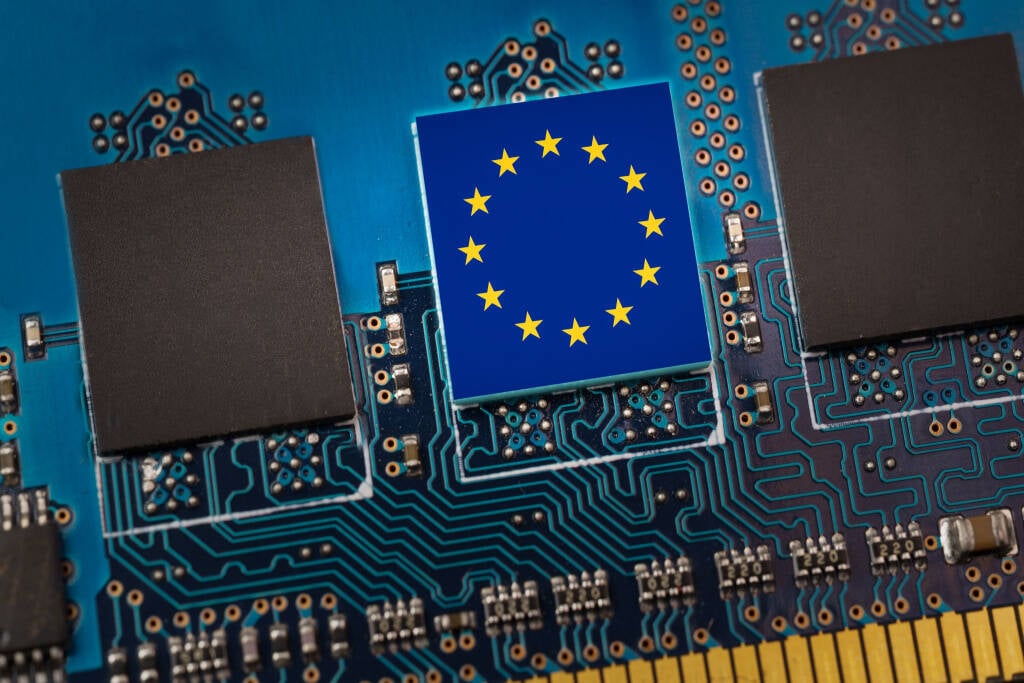Europe Finalizes €43B Chips Act It Hopes Will Help Free It From Foreign Fabs

The European Union has finalized a €43 billion bid to bolster domestic semiconductor production.
In a Tuesday statement, the European Commission said it has reached a provisional agreement on the terms of the European Chips Act, which seeks to double the EU's market share in semiconductor development, manufacturing, and material supply chains from 10 to 20 percent by the end of the decade.
"The new rules represent a real revolution for Europe in the key sector of semiconductors. A swift implementation of today's agreement will transform our dependency into market leadership; our vulnerability into sovereignty; our expenditure into investment," stated Ebba Busch, Swedish minister for energy, business, and industry.
The European Commission will use three tactics to achieve its goals. One is the Chips for Europe Initiative which gives funding to support the large-scale build out of semiconductor manufacturing capacity in the EU. The initiative has been hotly anticipated by chipmakers as they've plotted expansions throughout Europe.
The second and third initiatives will focus on supply chain security. Specifically, alleviating the region's reliance on foreign fabs.
"Currently, Europe is too dependent on chips produced abroad, which became more evident during the COVID crisis," the EC's statement reads.
The two provisions aim to directly address those concerns by both building European fabs and establishing local supply chain to feed those fabs with the components and materials necessary they need to function. To this end, the European Commission will see the creation of a monitoring and crisis response system to "anticipate supply shortages and provide responses in case of crisis."
- China the largest buyer of chipmaking machines as sales hit an all-time high
- Arm, Intel make it easier to churn out Arm SoCs from Intel fabs
- Why we think Intel may be gearing up to push its GPU Max chips into China
- TSMC wants to cash its US CHIPS but seems unhappy with the red tape
Following negotiations, the EC has moved to widen the scope of "first-of-a-kind" facilities to include those producing equipment used in semiconductor manufacturing. This is notable, as while semiconductor manufacturing is an intensely capex-heavy endeavor, the process relies on a wide variety of technologies ranging from electronic design automation (EDA) software to the multi-million dollar lithography machines used to etch microscopic features into silicon wafers.
As demonstrated by the US-China trade dispute, the supply chains for those technologies remain vulnerable to geopolitical interference. For instance, the US has successfully cut off Chinese chipmakers from American, Dutch, and Japanese lithography machines.
In this regard, Europe has something of an advantage over China as its home not only to ASML, the sole supplier of extreme ultraviolet lithography (EUV) machines, and to Germany's Siemens which develops EDA software used in the designs of integrated circuits among other chips-related products. Both firms appear to be eligible for funding under the European Chips Act.
While negotiations between the European Commission and Parliament may be complete, a bit more red tape needs to be cut before the act can be adopted. However, once signed, the Council can amend the Single Basic Act to establish the Chips Joint Undertaking, which will make as much as €43 billion in funding available to subsidize chips projects in the region. ®
From Chip War To Cloud War: The Next Frontier In Global Tech Competition
The global chip war, characterized by intense competition among nations and corporations for supremacy in semiconductor ... Read more
The High Stakes Of Tech Regulation: Security Risks And Market Dynamics
The influence of tech giants in the global economy continues to grow, raising crucial questions about how to balance sec... Read more
The Tyranny Of Instagram Interiors: Why It's Time To Break Free From Algorithm-Driven Aesthetics
Instagram has become a dominant force in shaping interior design trends, offering a seemingly endless stream of inspirat... Read more
The Data Crunch In AI: Strategies For Sustainability
Exploring solutions to the imminent exhaustion of internet data for AI training.As the artificial intelligence (AI) indu... Read more
Google Abandons Four-Year Effort To Remove Cookies From Chrome Browser
After four years of dedicated effort, Google has decided to abandon its plan to remove third-party cookies from its Chro... Read more
LinkedIn Embraces AI And Gamification To Drive User Engagement And Revenue
In an effort to tackle slowing revenue growth and enhance user engagement, LinkedIn is turning to artificial intelligenc... Read more

